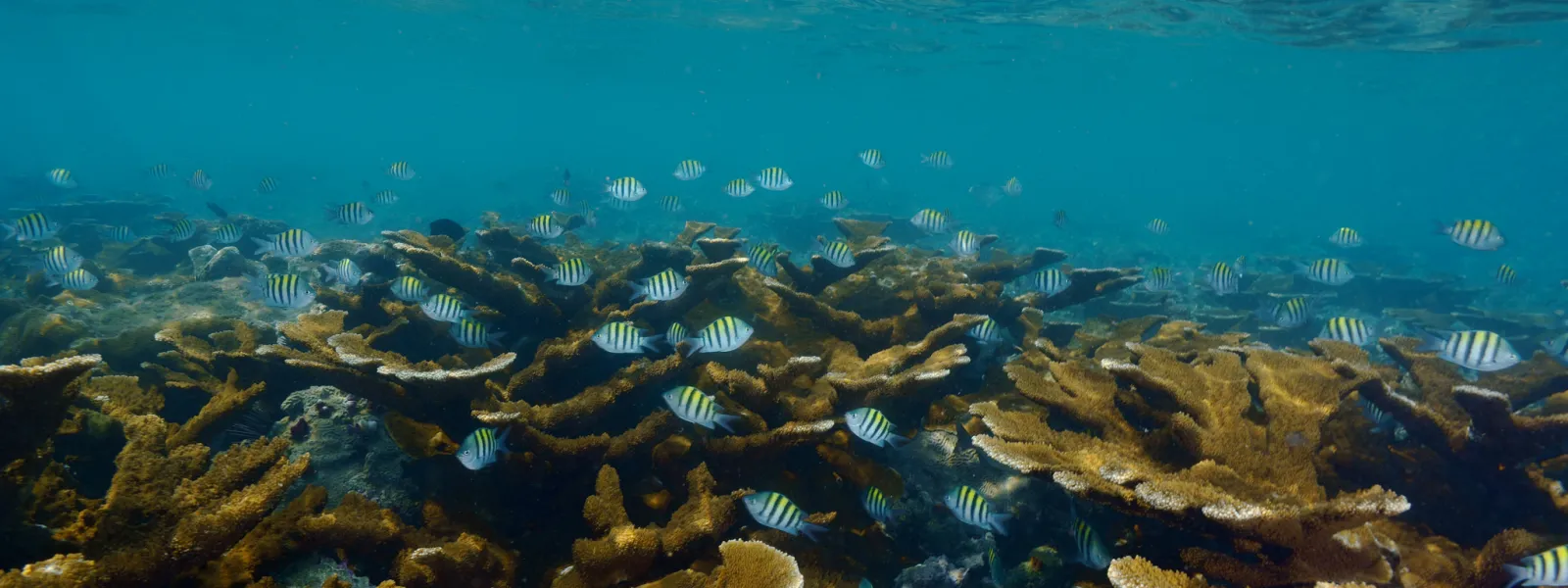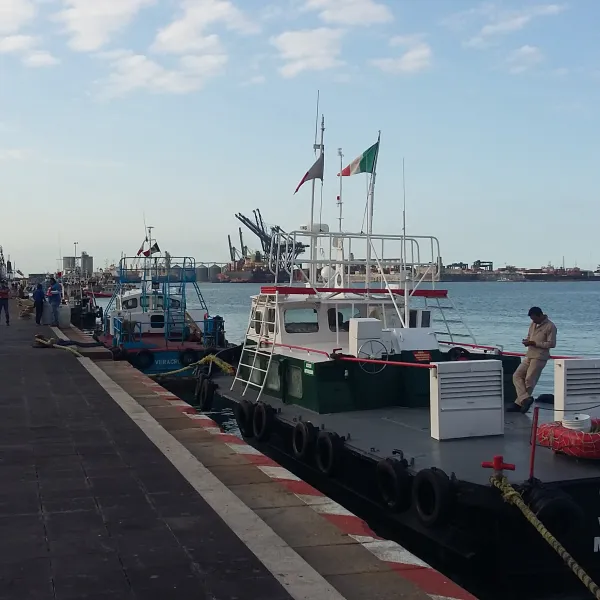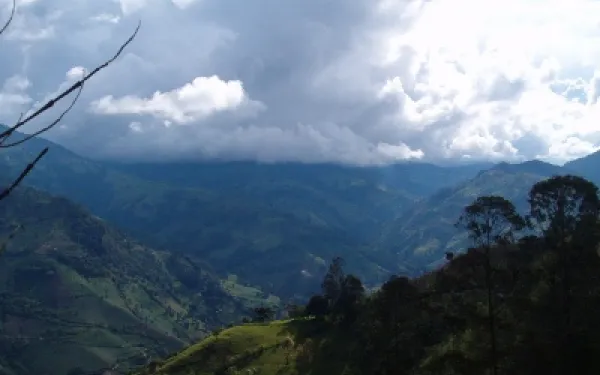
Project
Photo: Manuel VictoriaDefending the Veracruz Reef from a port expansion project
In the Gulf of Mexico, 27 coral reefs form a submarine mountain range running for miles between six islands. Hundreds of colorful fish species, sea urchins, starfish, and sea grasses share the reef with an abundance of other life forms. Fishing, sport diving, and beach tourism thrive along the coast. This is the magnificent Veracruz Reef, the largest coral ecosystem in the Gulf.
In 1992, Mexico’s government declared the Veracruz Reef System a Natural Protected Area. In 2004, it was listed as a Wetland of International Importance under the Ramsar Convention, a treaty for the protection of wetlands including reefs.
Despite the reef’s recognized significance, in 2013 the government reduced the size of the Natural Protected Area and approved a port expansion project. Local communities and organizations challenged the project's environmental permits, demanding protection of the right to a healthy environment.
On February 9, 2022, the Supreme Court of Justice of the Nation unanimously decided that the authorities violated the right to a healthy environment of Veracruz residents by authorizing the port expansion based on a fragmented environmental impact assessment. This means that the permits for the project are non-existent and that the impacts of the project on the health of the reefs must be studied again, this time in a comprehensive manner, and even the viability of the project.
The ruling is a historic precedent not only in Mexico, but for the entire region, as it allows access to environmental justice for the people neighboring an ecosystem affected by a project.
Partners:

Related projects

How we protect Andean ecosystems from mining's impacts
Few places in the world are so vulnerable to environmental degradation from mining than Colombia. The country ranks second in coal reserves in South America and is home to what could be one of the largest gold mines in the Americas. This means it is imperative to deal with the environmental problems linked to mining. Paradoxically, Colombia has a rich ecology. This ranges from forests to fragile environments such as páramos, or high-altitude ecosystems that capture water from fog and supply it to lowlands. Both have a rich biodiversity that would suffer devastating impacts from mining. But it’s not just the environment. The ethnic and rural communities that rely on these natural resources for their livelihoods are the most susceptible to mining. AIDA has worked to protect these Andean ecosystems, which are vital sources of water. Due to a shift in national policy from agriculture to mining as Colombia’s economic and industrial priority, the threats of mining are intensifying. In response, AIDA has used political and legal strategies to strengthen and enforce environmental legislation in the country. We have turned to comparative and international law to clarify the country’s legal requirements and establish precedents for the creation of public policies that protect fragile environments from large-scale mining. In this effort, AIDA helped the Inter-Church Commission for Justice and Peace, a Colombian human rights group, to file a lawsuit against the Mandé Norte project of Muriel Mining Corp. in the northeastern department of Chocó. With the resolution of this case (see above, Spanish only), Colombia's Constitutional Court set a crucial precedent. It ruled that indigenous and tribal communities have the right to freely access information about the project and to express their prior consent for the construction of the mine, all while under the protection of national and international laws. Specifically, the court ordered the Colombian government to stop all work on the Mandé Norte mine until the company carried out extensive studies on the potential environmental impacts and made a new and adequate consultation of the affected communities. The Ministry of Interior and the mining company asked the court to reverse its decision. AIDA and other organizations submitted requests (see our interventions, Spanish only) to keep the ruling intact. This finally happened on March 12, 2012 when the court confirmed its decision (see the confirmation of the sentence, Spanish only). To the east of the Mandé Norte project, another such project is threatening the environment and communities in the Santander department. AIDA is working to stop the construction of Angostura, an open-pit gold mine that Canada’s Greystar Resources Ltd. – now called Eco Oro Minerals Corp. – plans to build in the Santurbán páramos, high-altitude wetlands that supply drinking water to 2.2 million Colombians and help to mitigate the effects of climate change. During the environmental licensing process for the project, AIDA helped to demonstrate that Colombia’s legal obligations as well as international norms prohibit mining in the páramos. Based on this argument, Colombia’s Ministry of Environment, Housing and Territorial Development rejected (Spanish only) the environmental impact assessment denied the environmental license for Angostura in May 2011. But as the decision didn’t cancel the mining licenses, Eco Oro said it would seek to build an underground mine. In January 2013, the ministry declared Santurbán a Regional Natural Park, a move that can prevent the development of mining concessions in páramos areas. Through all of this, we found evidence of violations to social and environmental standards in the national and international funding for the Angostura mine by the International Finance Corporation (IFC), an entity of the World Bank Group. Given the alleged noncompliance with these standards, we teamed up with the Center for International Environmental Law (CIEL) and MiningWatch Canada to submit a complaint to the Office of the Compliance Advisor Ombudsman (CAO), the independent complaints office of the IFC. We called for an audit of the project and a subsequent divestment. The CAO decided to audit the investment process. The outcome could set a precedent to ensure that the IFC does not finance mining in páramos, a key decision given that such initiatives are planned elsewhere in Colombia as well as in Ecuador and Peru. In addition to these efforts, AIDA has been actively involved in the debate (Spanish only) concerning a boundary demarcation of Colombia’s páramos as a way to protect these ecosystems. According to Colombian law, the geographical location and characteristics of páramo ecosystems must be mapped out to establish their legal perimeters. Once officially determined, the boundaries will provide the basis for conservation measures, in particular the prevention of activities that cause irreversible damage. Together with prestigious Colombian environmentalists and society as a whole, AIDA has taken action (Spanish only) to press the Ministry of Environment to endorse a demarcation based on scientific criteria by adopting a new atlas of the páramos drawn up by Colombian officials. At the same time, AIDA has worked with other environmental organizations to investigate La Colosa, a mining project that South Africa-based AngloGold Ashanti Ltd. plans to develop in the forest reserves and the large farmlands of Tolima, a central-western department of Colombia. In this case, we have sought a more active and informed participation of citizens and compliance with the highest environmental standards. AIDA also has joined forces with other organizations to file a suit with the goal of analyzing the constitutionality of Colombia’s National Mining Code. The Constitutional Court has set important precedents regarding the need to protect environmentally sensitive areas and the importance of the precautionary principle. It also has set a precedent for ensuring the independence of environmental authorities in regard to mining authorities when it comes to awarding environmental licenses for mining projects. In addition to Colombia, AIDA has been enlisted to help halt the construction of mines in Bolivia, Ecuador, Costa Rica, Mexico, Panama and elsewhere. To do this, AIDA has developed legal and scientific resources from our analysis of case studies and writing of reports. These resources can be useful for protecting the environment and the rural and indigenous communities that are the most affected by mining.
Read more
The bicycle: Can it be our principle mode of transport?
By Astrid Puentes Riaño, co-director, AIDA, @astridpuentes Have you ever thought that bicycles could be our main mode of transport, or is it already for you? I tell people that I cycle, and that I live in Mexico City! I love riding on two wheels for many reasons: it’s environmentally friendly, and it’s easy, fast, cheap and fun. Many times I’ve ridden past cars idling in traffic, leaving them behind as I arrive at my destination in less time than if I’d taken a car or bus. Although it seems incredible, I hardly ever take a car. This might seem crazy given that we are in the modern era and I live in Mexico City, but its doable. I use Ecobici, a public rental service for bicycles. It’s not perfect, but it works well enough. I’m not saying that bicycles should be the only option for everyone. It works for me because most of the destinations I ride to are within a reasonable distance. Of course, when I need to go somewhere with my two year old, I resort to other means of transport such as our family car. As we all know, the increasing use of bicycles and other zero-emission modes of transport help to combat climate change in our cities. Sustainable transport alone will not provide the panacea for solving global warming, but it does go a long way in reducing its impact. The case of The Netherlands Riding a bike, especially in Latin America, can sometimes be more of a challenge than an adventure. I found a BBC article that explains why some countries like The Netherlands use bicycles on a grand scale. The reasons why are surprisingly simple. The country has: Excellent bike path infrastructure, with enough space for everyone to cycle, including children. A bicycle-friendly culture: Motorists respect cyclists because in most cases they either know someone who is a cyclist or they cycle themselves. Strict traffic rules for everyone: Motorists and cyclists alike face hefty fines if they park poorly on the street, travel in the wrong direction or do not follow traffic light rules. Tolerant neighbors allow cyclists to park their bicycles outside their houses, which is clearly a safe place to leave them! How can this be achieved? An interesting aspect in the case of The Netherlands is that civil society pressure and the oil crisis were decisive factors that influenced a considerable change in the country’s transport system. Like most countries in the 1950s and 1960s, the number of road vehicles in The Netherlands grew significantly and, with it, a rise in traffic-related accidents. The number of people killed in 1971 as a result of traffic accidents was 3,000, 450 of whom were children, according to the BBC. The sharp increase in deaths prompted a social movement called “Stop the Child Murder,” which called on the government to improve road safety for cyclists. These incidents, together with the oil crisis of the 1970s, led to changes in government policy, the construction of new bike infrastructure, improved safety standards and, above all, the framework for The Netherlands to take a new bicycle route of its own. Helmet or no helmet… Curiously, it is not mandatory to wear a helmet when bicycling in The Netherlands, as is also the case in much of Europe. Wearing a helmet is not considered necessary given the very low number of accidents and the high level of road safety. The obligation to wear a helmet is seen by many as an attack on the culture that promotes bicycles as a mode of transport. In Spain, there have been protests against government efforts to impose rules enforcing helmet use. In contrast: Cyclists of all ages must wear helmets in Australia and Dubai. It is mandatory to wear a helmet in some Canadian provinces, not others. United States federal law does not require cyclists to wear helmets, but cities like Dallas require helmets for cyclists of all ages, while only those under the ages of 16 and 18 in California and Washington D.C., respectively, are required to do so. Certainly any government attempt to implement policies on helmet use in Latin American cities would be difficult. On the one hand, it is a very real danger to cycle on busy cities, especially if drivers are not accustomed to sharing the roads with cyclists. On the other hand, mandatory helmet requirements could act as a disincentive to people in choosing whether to take up riding bicycles. Something to consider is that helmets alone do not prevent all accidents. A great majority of accidents -- children falling off their bicycles or collisions on the congested streets of Bogota and in other Latin American cities -- can be avoided if appropriate security measures are put in place. I myself had an accident at the age of three when my uncle took me for a ride on his Super Monareta (a Colombian brand of bikes) near my grandmother’s house. My left foot got stuck in the spokes of the rear wheel, badly injuring my inner foot and resulting in the destruction of my best pair of shoes. Fortunately, I came away with only a scar. But it could have been much worse. Progress in Latin America It’s pretty much impossible to compare our countries with The Netherlands. But I think the progress made and lessons learned there hold the key to bicycle reform, and are well worth noting. The good news is that various Latin American capitals have taken action to encourage the use of bicycles. Bike paths are expanding: Bogota has 297 km, Santiago is planning to build an additional 400 km in the inner city, Mexico City reached 42 km in 2012 and Buenos Aires has about 90 km. In reality there is still a great deal to be done and, fortunately, citizens are becoming more involved in the issue, demanding better infrastructure, improved security and air quality to ride something that is more than just a child’s toy. Hopefully progress will continue and we’ll finally see positive changes toward the adoption of fun, environmentally friendly and cheap forms of transport like cycling. What do you think? Do you dare ride a bike?
Read more
"No thank you" says the Green Climate Fund Board to transparency and civil society input
By Andrea Rodríguez, legal advisor, AIDA,@arodriguezosuna Once again civil society organizations expressed disappointment at the lack of transparency and civil society engagement at the latest meeting of the board of the Green Climate Fund (GCF), an operating entity of the United Nations Convention Framework for Climate Change (UNFCCC). The 24-member board met June 25-28 in Songdo, South Korea to further advance a process of putting the GCF into operation. The GCF will operate as a mechanism for transferring funds from the developed to developing world in order to help developing countries finance adaptation and mitigation practices to combat climate change. Civil society organizations have been constantly asking the GCF board for better opportunities for civil society to effectively be involved in the GCF decision-making process. Organizations have sent letters to board members, advisors and the GCF Interim Secretariat. But these many attempts to draw attention and consideration to civil society’s concerns have come to no avail. The board has constantly closed the doors to civil society’s active and effective participation. At board meetings, civil society may only have two active observers in the meeting room: one representing the north and the other the south. The other accredited observers have to sit in an overflow room to watch the meeting. The two active observers may only engage in the meeting if invited by the co-chairs of the board. Only one intervention can be made per each agenda item of the meeting and for no more than three minutes each time. On the last day of the Songdo meeting, the co-chairs disallowed any interventions from civil society, claiming there was not enough time. Ironically, the most important decisions were made on the last day. Given these limitations imposed by the co-chairs, the two active observers in the meeting room approached several board members to share key points on different papers from the perspective of civil society. The co-chairs, however, penalized this action and forbade the active observers from talking to board members. Despite the frustration of the being undermined and excluded, civil society was hoping to win at least one battle at the meeting: getting the board to decide in favor of live webcasting. Live webcasting shows a commitment to accountability and transparency. It provides opportunities for people without the resources to travel to board meetings to get involved in the meeting while also limiting the CO2 emissions generated by each board meeting through a reduction in the number of international flights taken for attendance. Webcasting is widely used by climate-related funds and is even used by the UNFCCC, the international environmental treaty of which the GCF is part. In Songdo, the GCF board decided against live webcasting on the argument that it would be too expensive at US$20,000 to US$30,000 per meeting. The board’s reference prices, however, are far more than the market average of US$1200 per day. According to the Adaptation Fund (AF) Secretariat and its webcast provider, live-streaming of AF board meetings costs about $1,000-$1,250 per day of broadcast, depending on site specific issues. Instead of live webcasting, the GCF board agreed to make webcasts of the meeting accessible three weeks after the event upon registration. Civil society organizations believe that this three-week delay prohibits organizations from advocating on the issues related to the discussions and decisions at the meeting. The Green Climate Fund has decided to have a strategic focus on climate mitigation and adaptation and seek to maximize sustainable development. Nevertheless, it is difficult to understand how the fund would ever be able to maximize “sustainable development” if its decisions are not made with the support of effective stakeholder participation and engagement throughout the whole process.
Read more